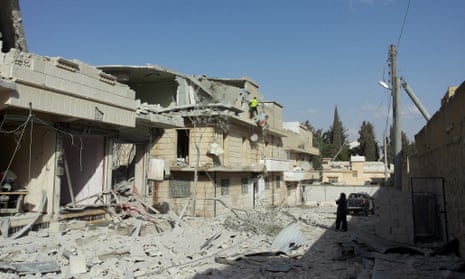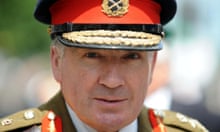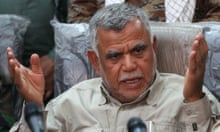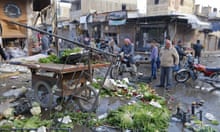The Republican speaker of the House of Representatives, John Boehner, on Sunday ramped up the political rhetoric over Syria and Iraq by saying American forces will need to be put on the ground in the battle against the Islamic State (Isis).
Boehner’s comment that at some point “boots have to be on the ground” marks a significant inflation in the terms of the debate over how to deal with Isis. President Barack Obama has repeatedly said US ground forces will not be used in the conflict, which on Sunday saw US-led strikes in Syria and the first British strikes in Iraq, though the Pentagon has ordered the dispatch of 1,600 US troops to Iraq for what it insists will be training and other support functions.
Speaking to ABC News, Boehner criticised Obama’s plan to degrade and ultimately destroy Isis. “If the goal is to destroy Isil as the president says it is,” he said, “I don’t believe the strategy he outlines will accomplish it. At the end of the day I think it’s going to take more than airstrikes to drive them out – at some point somebody’s boots have to be on the ground, that’s the point.”
Asked whether such boots would need to be American ones if other countries failed to step up to the challenge, the top Republican in the House replied: “We have no choice. They intend to kill us. These are barbarians, if we don’t destroy them first we are going to pay the price.”
While Boehner introduced the idea of a ground war against Isis, the Obama administration continued to stress that it had no intention of being sucked back into an Iraqi war involving forces on the ground. Tony Blinken, the deputy national security adviser in the White House, told Fox News Sunday the air campaign in Syria and Iraq was totally different to the prolonged wars of the past decade.
“We are not sending hundreds of thousands of troops back to Iraq or Afghanistan or anywhere else,” he said. “We are not going to be spending trillions of American dollars. What we are doing is supporting local forces with some of our unique assets – air power, training and equipment, intelligence. They will be doing the fighting on the ground.”
Blinken said the administration was determined not to fall into what he called an “al-Qaida trap” that involved sending hundreds of thousands of US troops back to Iraq. “That’s exactly what they want us to do – to bog us down,” he said.
The debate in Washington over the roll of ground forces came as the US-led coalition continued to pound Isis positions in Syria and Iraq from the air.
US-led forces attacked new targets in eastern Syria and along the Syrian border with Turkey, in an attempt to disrupt Islamic State (Isis) oil supplies and halt the militants’ relentless advance through Kurdish villages. In Iraq, British jets carried out bombing missions for the first time.
Monitoring groups reported that a fresh wave of strikes had been launched on Saturday and into Sunday morning in the eastern province of Raqqa and in the Kobani region along the Turkish border. The bombing raids were led by the US, but the Pentagon stressed the involvement of Saudi Arabia, Jordan and the United Arab Emirates.
The Obama administration is keen to portray the assault on Isis as being carried out by a broad coalition that includes Arab states, rather than as a replay of unilateral US intervention in the Middle East.
The Kobani strikes were the first in an area that has seen Isis advance through Syrian Kurdish villages, forcing an exodus across the border into Turkey of at least 150,000 people. Kurdish leaders in both Syria and Iraq have pleaded with the US-led coalition for more than a week to do something to impede the militants’ advance through a rural area with a population of about 400,000.
The air assault was relatively modest, destroying a building and two armoured vehicles, according to US central command. Ojlan Esso, spokesman for the Syrian Kurds in Kobani, said 35 Isis fighters were killed in the strikes.
The arrival of the fighter jets was welcomed by Syrian Kurdish leaders, who had been expressing growing anger at the failure of the US to act while one village after another fell to the militants. The Kurds, armed only with light weapons, have been overwhelmed by much more heavily armed Isis fighters.
The strikes on Raqqa focused on a main stronghold of Isis forces as well as makeshift oil refineries that are used by the militant group to secure petrol supplies.
The US has been pounding Isis from the air in Iraq from 8 August and inside Syria for six days.
On Sunday, it was reported that a Twitter account run by an al-Qaida member said Muhsin al-Fadhli, the leader of the al-Qaida linked Khorasan group, was killed in a US air strike in Syria this week. On Wednesday, the Pentagon said it was still investigating whether Fadhli had been killed in the Tuesday strike, as had initially been claimed.





Comments (…)
Sign in or create your Guardian account to join the discussion